Regretting China's absence at key space forum in US
By ZHAO HUANXIN in Washington | chinadaily.com.cn | Updated: 2019-10-24 10:50

China's absence from an important global space conference was a missed opportunity for collaboration, an American scientist said at the 2019 International Astronautical Congress (IAC) on Wednesday.
The Chinese space delegation, whose members include Wu Yanhua, vice-administrator of the China National Space Administration, was absent from the weeklong 70th IAC, scheduled to conclude Friday in Washington.
A moderator of an opening plenary panel where Wu was expected to speak on Monday said Wu's absence was because of a "scheduling conflict".
But China's Foreign Ministry confirmed early Wednesday that it was due to a visa issue and it urged Washington not to "weaponize" visas and hinder normal international cooperation.
"I think it was hoped that China would be present so that multilateral talks could be undertaken," said Notre Dame planetary scientist Clive R. Neal. "Everyone was disappointed! I am saddened that the political situation between our two countries gives the perception that we are in opposition."
The world's top two economies have been locked in a trade war since early last year, with tensions only starting to ease following "substantial progress" in their latest round of talks earlier this month.
There are a growing number of Washington insiders who perceive China as a grave military and economic threat necessitating confrontation. In contrast, 2 in 3 Americans prefer friendly cooperation and engagement with China, according to the 2019 Chicago Council Survey, which was released in early September.
Neal, who was appointed by the National Academies Executive Office as a new member of the Committee on Astrobiology and Planetary Science in April, was in Washington to attend the annual event. He said the absence of China led to disappointment over a missed opportunity.
"I believe that at least at the scientist level, we want to cooperate and work together to get humanity out into the solar system," Neal told China Daily. "I think it is critical that the scientists keep working together as best as they can so communication lines are kept open."
Neal said American scientists in the US are working hard to maintain collaborations with their Chinese peers.
"At this level, there are no strained relations. I think also at the NASA level, relations would be good. Both our countries need to solve this issue at the political level," he said.
Speaking at the opening of the conference, US Vice-President Mike Pence said that with renewed American leadership in space, the US seeks to work closely with "like-minded, freedom-loving nations" in space exploration.
Neal said the vice-president "was playing to an American audience".
"I am not a politician, but I think communication and dialogue are critical to stop misunderstandings," he said. "Both Chinese and American scientists need to work with their political officials to show we can cooperate."
Commenting on matters discussed at the IAC on Monday, Erwan Beauvois, a space operations engineer from Thales Alenia Space in France, tweeted: "Dodging the spicy questions:-/ so many people asked about China and international cooperation. M. Pence's speech of this morning surely didn't resonate well to most of the international partners either. #IAC2019"
China hosted the 64th IAC in Beijing in 2013, and participates in the conference every year. It has always championed multilateral cooperation in space exploration, according to a white paper on China's space activities in 2016.
In an interview with China Daily in January, James W. Head, a professor of geological science and planetology at Brown University, who had participated in all of the Apollo space missions in the 1960s and '70s, said he was still hopeful for greater China-US space cooperation.
"There are always political tensions between countries. But the fact that the US-Soviet Cold War ended in an international space station with American astronauts being launched on Russian rockets, and very close cooperation, gives hope for future cooperation," Head said. "Many policymakers see it as a way to reduce tensions."
As of Wednesday night, Wu of the China National Space Administration was still listed as a speaker of the annual IAC event's opening plenary panel on the IAC website.
"I miss an important space agency in this panel. Where is China?" read the most popular crowd-sourced question displayed on the screen, which served as a background on the stage for panel speakers on Monday.
"Audience questions are getting upvoted, and there is a definite consensus on asking why China is not part of this panel," the "WeMartians Podcast" tweeted.
























